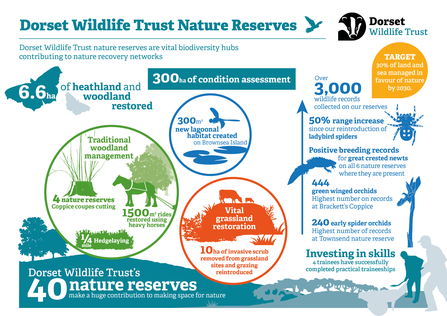Dorset Wildlife Trust owns and manages over 40 amazing nature reserves across the county. for the benefit of wildlife and people. From Poole Harbour and the heathlands in the east of the county, to the hills and vales of west Dorset, these wildlife-rich sites represent all of the major habitat types found in Dorset and are home to some of our rarest species. All of our nature reserves are open and accessible free of charge to everyone, enabling people to learn about, enjoy and benefit from regular contact with nature.

Dorset Wildlife Trust
An unprecedented ecological crisis
Sadly, the UK is one of the most nature depleted countries in the world and we are facing an unprecedented ecological crisis. Our nature reserves have increasingly become the last remaining fragments of wildlife habitat within degraded landscapes. Nature reserves have a crucial role to play in addressing this crisis.
Nature reserves are biodiversity hubs and must be managed as the foundational building blocks for nature’s recovery. Together with our 46 partner Wildlife Trusts, we have set ourselves the ambitious goal of ensuring that 30% of land and sea is managed in favour of nature by 2030. To achieve this, we must work closely with our neighbouring farmers and landowners to improve the way our nature reserves interact and integrate with the wider landscape. By restoring, expanding and connecting sites through the creation of stepping stones and corridors for wildlife, we can create nature recovery networks that provide much needed space for nature to play a strategic role in linking together wildlife and people.
In addition to the important role of nature reserves for biodiversity they also provide valuable access to nature for people and communities across Dorset. Regular contact with nature is good for people providing benefits to our physical and mental wellbeing. All Dorset Wildlife Trust nature reserves are open access, enabling everyone to enjoy and create relationships with nature in their own communities.
The value of nature reserves for our wellbeing was clearly demonstrated throughout the Covid-19 crisis. With the closure of many public amenities, such as parks and gardens, the value of nature reserves as open access greenspace became even more valuable, attracting many people new to nature; many of whom have gone on to become Dorset Wildlife Trust supporters and volunteers.
Volunteering is one of the best ways to experience and benefit from nature, while also helping to address the ecological crisis. The support of volunteers is vital in ensuring that our nature reserves are well managed and in good condition as we fight to create a wilder Dorset. If you are interested in becoming a volunteer, please use the link below to get in touch.







